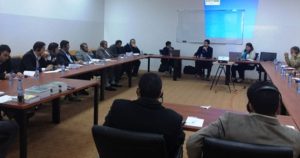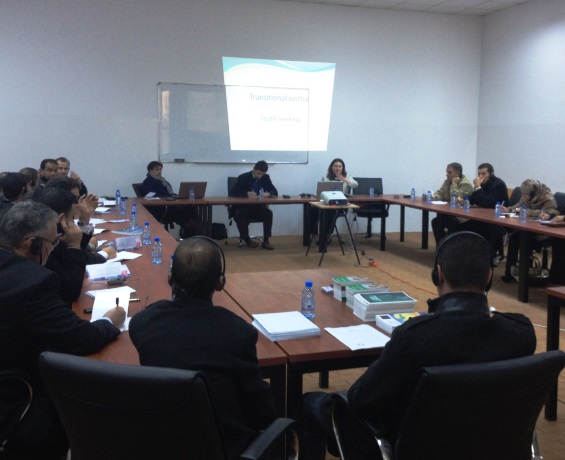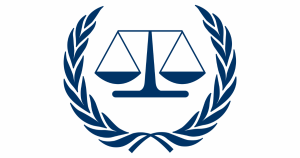Misurata, Libya, 16-18 December 2013
NPWJ conducted a three-day field visit to Misurata on 16-18 December 2013 in the framework of its Transitional Justice Program. The purpose of the visit, organised in collaboration with the Libyan Ministry of Justice and the Criminal Court of Misurata, was to conduct a workshop on Transitional Justice, to increase collaboration with the local prosecutors and legal practitioners involved in investigating crimes under international law, and to visit Misurata criminal court and some detention centres. Misurata was an important location of the revolution in Libya where massive fighting occurred during the conflict.
More than 20 participants, including law students, lawyers, prosecutors and human rights activists, attended the training course, held at Misurata University. The training included contributions from two foreign experts, namely Ms Amel Ouachi, a Tunisian judge, who has been involved in NPWJ activities both in Tunisia and in Libya, and Ms Francesca Del Mese, an international lawyer specialised in Human Rights.
The workshop introduced participants to key accountability and transitional justice mechanisms, focusing on specific challenges related to investigation, documentation and prosecution of crimes and human rights abuses within the Libyan context. Participants also discussed legislative reforms carried out by the Libyan authorities, including the newly approved Transitional Justice law, and compared them with other similar initiatives, in particular the ongoing transitional justice process in Tunisia.

The field visit provided an opportunity for NPWJ staff to attend ongoing hearings at the Misurata Court, involving both ordinary crimes and crimes related to the conflict, and to meet with Libyan prosecutors and lawyers and understand the main challenges they are facing. NPWJ staff visited the Misurata military detention centre, which is holding more than 900 detainees, including some of the main figures related to the past regime, as well as soldiers and civilians accused of committing massive human rights violations during the revolution.
In response to specific demands raised by local civil society organisations, prosecutors and other legal practitioners, NPWJ plans to organise further initiatives aimed at strengthening their capacity to promote accountability, the rule of law and reconciliation within their community.
NPWJ in Libya
NPWJ has been working on the Libyan transition since early 2011, in the framework of its project to support Libya’s democratic transition through justice and accountability. As the country embarks on legislative reforms, the Libyan authorities can break with the legacy of impunity and abuses that typified Gaddafi’s rule with a new respect for the rule of law and a commitment to restoring justice and dignity to victims. Doing so requires not only the investigation and prosecution of the crimes and violence perpetrated during the revolution, but also efforts to confront a history of oppression and human rights abuses that dates back decades under the rule of the former regime.
For further information on the activities of NPWJ in Libya please contact Stefano Moschini, Libya Program Coordinator, at smoschini@npwj.org or +218917450375.




